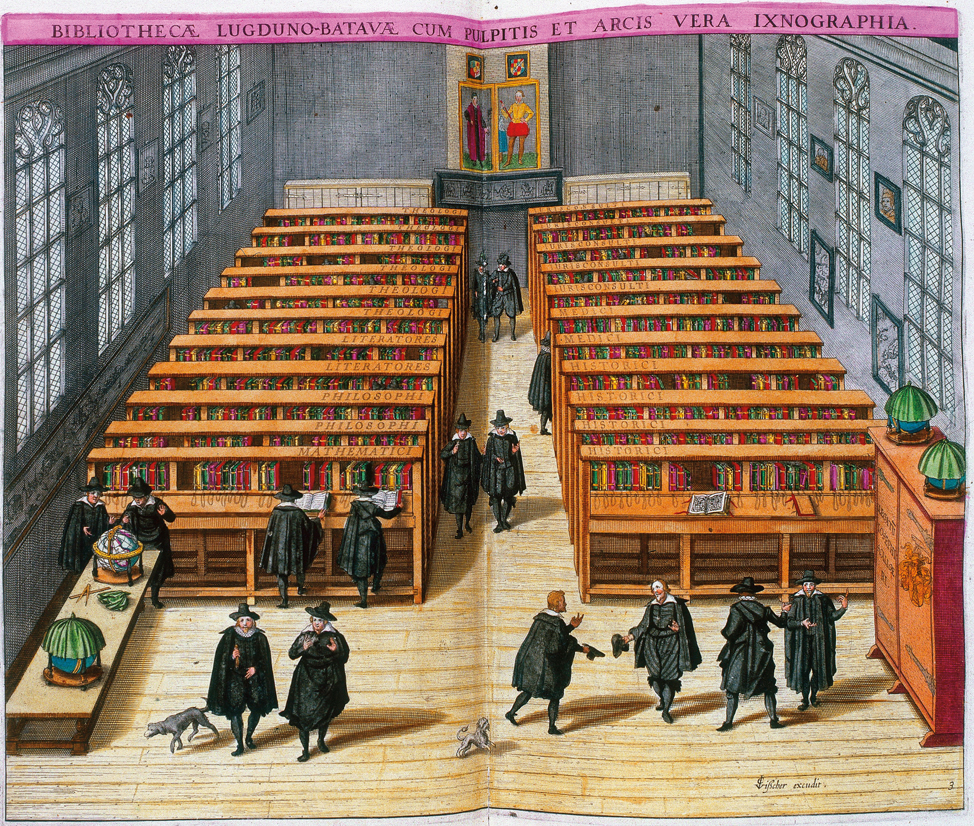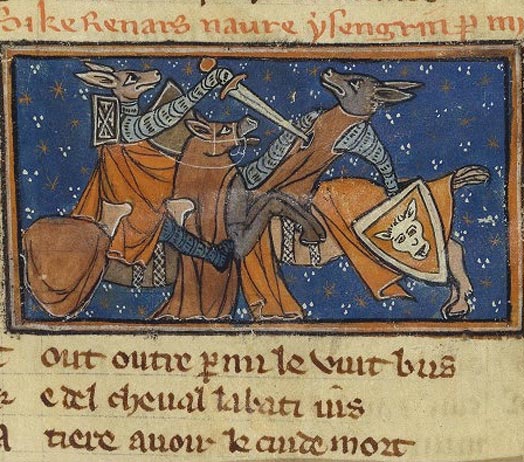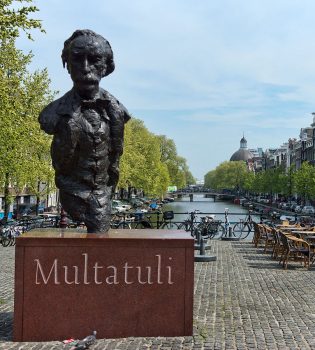Dutch Literature for Language Learners: 8 Books to Add to Your Reading List Posted by Jakob Gibbons on Nov 8, 2016 in Uncategorized
Reading is one of the best ways to strengthen your language skills by learning new vocabulary in context and engaging thoughtfully with new ideas in a foreign language. When it comes to providing page-turners that build your vocabulary and deepen your cultural insights, Dutch literature doesn’t disappoint.
Whether it’s a comic book, a Wikipedia page, or the great classic works of literature, reading in a foreign language is a chance to learn vocabulary and all its nuances in a culturally contextualized, low-stress environment.
A book won’t stare at you blankly while you mull over the last thing it said, and your Kindle won’t roll its eyes and switch to English when it’s tired of waiting for you to catch up with the conversation.
What’s more, whether we’re talking ink and paper or ones and zeros, the written word is dripping with cultural learning opportunities. Just like watching TV for language learning, engaging with a language’s cultural products in the form of literature deepens your understanding of a language, the people who use it, and the social and historical context in which the language has grown and evolved.

Image via Pixabay under public domain.
Lucky for Dutch language learners, the Netherlands has a literary tradition rich enough to go toe to toe with its larger and linguistically more famous neighbors like Germany, France, and England. You may not have read many Dutch titles in your Intro to World Lit class, but now’s your chance to make up for lost time.
Reading recommendations and lists of Nederlandse klassiekers are everywhere. You’ll find lists of De 10 beste Nederlandse romans allertijden or 20 Nederlandse boeken uit de 20e eeuw die je gelezen moet hebben from various sources across the web, and the Digitale Bibliotheek voor de Nederlandse Letteren (DBNL) also has a great list of de Nederlandse literaire canon in honderd (en enige) auteurs, replete with online full-text links to many of the works it mentions.
For a more timely look at what’s culturally relevant now, you’ll find annual lists of the best books of the year in many Dutch and Flemish periodicals like the Volkskrant, NRC, and Knack. Furthermore, De Bestseller maintains a list of the 60 hottest works appearing in Dutch bookstores that’s updated weekly.

Leiden University Library, an important intellectual and cultural center during the Renaissance and Enlightenment, in the early 17th century. Image via Wikimedia Commons under public domain.
Dutch learners and lit-lovers looking for a structured introduction to Dutch literature can start with Wikipedia’s pages on Nederlandse literatuur and De canon van de Nederlandse letterkunde. Not only is it a meta opportunity for reading about reading in Dutch, but the Wikipedia format is an ideal setting for opening a couple new tabs and scanning entries on different authors, genres, periods, and works to see what best fits your taste.
For an abbreviated introduction to some of the highlights, here’s a quick crash course.
An 8-Book Introduction to De Nederlandse Literatuur
Based on research, the opinions of the literary powers that be, and my own experience as a bookwormish Dutch learner, here’s a starter list of the best Dutch page-turners that’ll up your vocab and cultural knowledge game with.
De Ontdekking van de Hemel
Harry Mulisch’s magnum opus is often unironically referred to as the absolute best book in all of Dutch literature. We’ve raved about his captivating but down-to-earth writing style on this blog before, and it’s exactly this gift with words that propelled Mulisch into the literary spotlight in the 1990s with De Ontdekking van de Hemel.
Part historical fiction, part fantastical frame story, De Ontdekking van de Hemel advances in the form of a conversation between two angels that cast a different narrative light on the first world war. The depth and detail of the story will be enough to make learners forget they’re reading in a foreign language as they’re dragged from Austria to Leiden and ever deeper into the epic tale.
Het Achterhuis
You may have already read the Diary of Anne Frank in high school, but don’t forget that this up-close account of Nazi occupation was originally written in Anne Frank’s native Dutch. Thanks to Miep Gies, who helped shelter Anne and her family and later discovered Anne’s dagboek, this priceless piece of twentieth century history is now also one of the most famous works of Dutch literature throughout the world.
This makes Anne’s dagboek an especially good choice for learners for two reasons: because Anne’s thirteen-year-old vocabulary isn’t as challenging as that used by the adult writers of some of the other titles listed here, and because it’s a storyline most readers will already be familiar with, allowing you to better understand new vocabulary in a familiar context.
Van den Vos Reynaerd
Medieval Dutch literature had its own share of epic poetry recounting everything from chivalric romances about Arthur’s knights to devotional homilies singing the saints’ praises, and the epic Van den Vos Reynaerd is considered one of the period’s high points.

A manuscript illustration from a 13th century text of Van den Vos Reynaerde.
Image via Wikimedia Commons under Public Domain.
An estates satire typical of medieval literature, Reynaerd pokes fun at the three ‘estates’ of medieval society: de geestelijkheid (the clergy), de adel (the aristocracy), and de burgerij (the commoners), criticizing each group’s stereotypical trappings and in the process making a meta-criticism of medieval literature itself. Just be sure if you add this to your reading list to get a modern Nederlands editie, as the original language it was written in in the thirteenth century, middelnederlands, will be quite the challenge to Dutch learners and most native Dutch speakers.
Het Huis van de Moskee
In the same popular poll that placed De Ontdekking van de Hemel as the #1 Dutch book aller tijden, Kader Abdolah’s Het Huis van de Moskee came in second. In many ways the Iranian-Dutch writer’s most famous work, about the fall of the Shah and the rise of Ayatollah Khomeni in Iran, may be even more relevant today than it was when it was published in 2005.
Abdolah’s crowning achievement is also the most shining example of the growing genre of immigrantenliteratuur, the great works of which provoke questions about identity and the meaning of ‘home’ in the multicultural society, a fertile ground for literary investigation in twenty-first century Europe.
Het Diner
The best-known work of popular contemporary author Herman Koch tells a believable but slightly dystopian story of human compassion and the lack thereof. Written in a style that’s descriptive, exciting, and at the same time uncomplicated to read, it’s an ideal introduction to the kind of literature that’s on modern bestseller lists in the Netherlands.
The book was popular enough to become a movie, currently available on Netflix for viewers watching from a Dutch IP address, and there’s more than one way to find this and other Dutch movies online. Read our earlier review of Het Diner for more on the book and why you should read it!
De Asielzoeker
Arnon Grunberg is the it-boy of the modern Dutch literary scene. In addition to writing for the most prestigious and progressive journalistic sources in the Netherlands, like de Volkskrant and de Correspondent, Grunberg has written dozens of novels, plays, essays, poems, and nearly any other literary form you can imagine.
Among all his works and awards, De Asielzoeker is one of the bestselling and most prize-winning. Writers and literary critics at De Groene Amsterdamer named it one of De 21 belangrijksten romanen van de 21st eeuw, and not just for the prestigious AKO Literatuurprijs it won in 2004. But don’t be confused by the title: de asielzoeker has nothing to do with the vluchtelingencrisis, but instead explores a more metaphorical form of asylum-seeking.
Het Verdriet van België
Flemish literature often gets overlooked in discussions of the best Nederlandstalige literatuur, although recent years have seen efforts to create a more inclusive nieuwe canon van de Vlaams-Nederlandse literatuur. In any case, Het Verdriet van België is the biggest reason that author Hugo Claus is generally considered the belangrijkste Vlaamse schrijver aller tijden.
The book is a coming of age tale about a young Flemish boy from a family of Belgian Nazi sympathizers. Through the course of the historical fiction novel, Claus gives a stunning historical view of the many national and personal conflicts that raged during the second world war through the perspective of an idealistic youth who opens his worldview through forbidden books.
Max Havelaar
One of the most important works in the history of the Netherlands and its literature, Multatuli’s Max Havelaar is a tale of corruption and oppression in Nederlands Oost-Indië (modern-day Indonesia) that’ll remind English readers of the works of George Orwell. In addition to being a gripping story told through the perspectives of multiple characters, Max Havelaar is seen as having had a lasting impact on Dutch colonial policy and ultimately helped lead to Indonesia’s independence in 1945.
For culturally and historically curious language learners, Max Havelaar is your express ticket into the depths of Dutch colonial literature. It’s a text that no Dutch high school student makes it to graduation day without at least pretending to read, and it’s one of the great artistic masterpieces of the Low Countries.

A sculpture of Multatuli, one of the most famous and influential figures in all of Dutch literature, in Amsterdam. Photo by Jean-Christophe BENOIST – Own work via Wikimedia Commons under CC BY 3.0.
For more recommendations on Dutch literature of all kinds, as well as regular blog articles in Dutch about books and reading, check mustreads.nl. And for a more expansive overview of the literature of het Nederlandstaalgebied, including peoples and cultures that range from the Caribbean to Southeast Asia, Limburg to Friesland, browse through the DBNL’s atlas voor de Nederlandse Taal en Literatuur.
Literaire woordenschat:
- het boek: the book
- de roman: the novel (not to be confused with English ‘romance’)
- het dagboek: the diary
- de canon: the (literary) canon
- de klassieker: the classic (as in ‘classic works of literature’)
- het verhaal: the story
- nederlandstalig: adjective – Dutch-speaking, Dutch-language
- de letterkunde: the study of literature; the literary arts
- de literatuur: literature
- literair: literary
- de poëzie: poetry
- de schrijver: the writer
- de schrijfster: the writer (feminine)
- de dichter: the poet
- de dichteres: the poet (feminine)
What are your favorite works of Dutch literature, and which have been most helpful or enjoyable in learning Dutch? Tell us about it in the comments!

Build vocabulary, practice pronunciation, and more with Transparent Language Online. Available anytime, anywhere, on any device.
About the Author: Jakob Gibbons
I write about language and travel on my blog Globalect. I often share my experiences with learning languages on the road, and teaching and learning new speech sounds is my specialty.




Comments:
Peter Simon:
Thank you for this excellent list of recommendations. Will try a few later.
However. … “Het Huis van de Moskee” may be popular, may even be good, but I’d like to warn those who’re considering reading another of Kader Abdollah’s books that his “De kraai” could be the worst book I’ve ever read. Honestly. And I’ve read over a thousand books in my life. Just to clarify his achievement as a non-Dutch-born writer, I’d add my earlier Dutch teacher’s warning: his Dutch is far from good, he’s always heavily edited for the printing press. Also, my guess is that he only writes about the same story – that of his own life – over and over again. Chaotic and self-pitying though and through, though he tries to conceal this latter under pride about his achievement, which, however, is also not a laudable quality at all.
On the other hand, though heavy literature, I would recommend reading H. Mulish. Although his “Chantage op het leven” may not be among his best, his “De Aanslag” is one of the most interesting, touching and well-written books about WWII I’ve read – and again, I’ve read quite a few (Eric Knight, Kurt Vonnegut and others in the English-language literature and a number of Hungarian writers, beside all the compulsory Hemingways). Just don’t expect easy reading with Mulish.
droog:
Which of these would be easiest for a novice Dutch learner?
Jakob Gibbons:
@droog I think Het Achterhuis is probably the easiest in terms of style and vocabulary on this list, but depending on how ‘novice’ you are, it would still be a challenge for fresh beginners! If you’re brand new to the language, you could get started with children’s books like Jip en Janneke: https://blogs.transparent.com/dutch/annie-mg-schmidt-jip-and-janneke/.
I’ll give some more suggestions for beginner reading materials in an upcoming post!
droog:
@Jakob Gibbons Thanks so much!